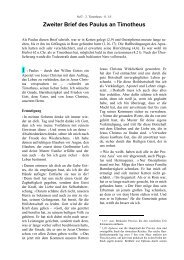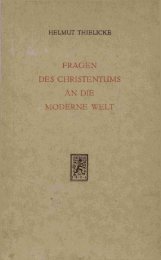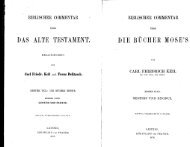You also want an ePaper? Increase the reach of your titles
YUMPU automatically turns print PDFs into web optimized ePapers that Google loves.
with Abraham (Gen 15:7-21, 17:3-14), and on<br />
Mount Sinai (Ex 19 – 24). There never was a better<br />
covenantal partner than God Himself.<br />
Faithfulness implies an inner attitude which<br />
keeps us to our promises and duties. This fundamental<br />
trustworthiness is closely connected with<br />
truth and righteousness. The phrase “in good<br />
faith” refers to an oral treaty which is regarded<br />
as being just as binding as a written one. All<br />
human faithfulness is based on and derives from<br />
God’s good faith. Marriage as an institution of<br />
God is founded on faithfulness. He expects us to<br />
be true in our daily life and also to Him: “Be<br />
faithful, even to the point of death, and I will<br />
give you the crown of life” (Rev 2:10).<br />
We are able to commune with God,<br />
just as He communes with us<br />
To have communion with somebody, means to<br />
have a very close mutual relationship of give and<br />
take. According to Colossians 1:16 we have been<br />
created by and for Christ. This was the purpose of<br />
creation and we have been made to have communion<br />
with our Creator. But this relationship<br />
was destroyed by man’s fall into sin, like a broken<br />
marriage. In both cases the partners have lost<br />
their original close communion, resulting in tears<br />
and heartache.<br />
Only by way of a thoroughgoing repentance and<br />
conversion to Christ (see following chapter) can<br />
communion with God and his Son be restored. In<br />
the New Testament a short formula is used to<br />
describe this restored relationship with our Creator,<br />
namely being “in Christ”. This phrase is used<br />
80 times, for example in 2 Corinthians 5:17: “if<br />
anyone is in Christ, he is a new creation.” This<br />
new relationship is close and intimate, as<br />
described by Paul in Galatians 2:20: “I no longer<br />
live, but Christ lives in me”. The purpose of creation<br />
has been restored. Whoever belongs to<br />
Christ will also want to regularly fellowship with<br />
other Christians.<br />
Paul describes believers, with their various natural<br />
and spiritual talents, as being members of one<br />
body, and all together they are members of the<br />
body of Christ (1 Cor 12:27). When partaking of<br />
the Lord’s Supper, we celebrate our communion<br />
with Christ. The apostle John describes the<br />
restored communion in the following words: “so<br />
that you also may have fellowship with us. And<br />
our fellowship is with the Father and with his<br />
Son, Jesus Christ” (1 John 1:3).<br />
The consequences of communion with Christ are<br />
far-reaching:<br />
– we share Christ’s life (Rom 6:8)<br />
– we share His resurrection (Col 2:12)<br />
– we are co-heirs with Christ (Rom 8:17)<br />
– we will be raised in His glory (Rom 8:17)<br />
– we will reign with Him (2 Tim 2:12).<br />
Further human characteristics<br />
which distinguish us from the<br />
animals<br />
The above ten aspects are only true for human<br />
beings, and clearly separate us from the animals.<br />
We want to emphasise this here, since we are continually<br />
bombarded, in many ways, with the idea<br />
that we have descended from some line of animals.<br />
A few further aspects of being human are:<br />
– We are historical beings. We record past<br />
events, retell them, contemplate them, and<br />
sometimes we even learn from them.<br />
– We yearn to know a cause for things, to have<br />
an explanatory world and life view for all of<br />
reality. Only human beings are concerned with<br />
their origin, with the purpose of life, and with<br />
where we are going.<br />
– Only human beings contemplate death and<br />
bury our dead. Eternity has been put in our<br />
hearts (Eccl 3:11). One look at the pyramids of<br />
Gizeh establishes this fact. The Egyptians knew<br />
of life after death, and they tried to provide for<br />
it according to their ideas.<br />
105
















